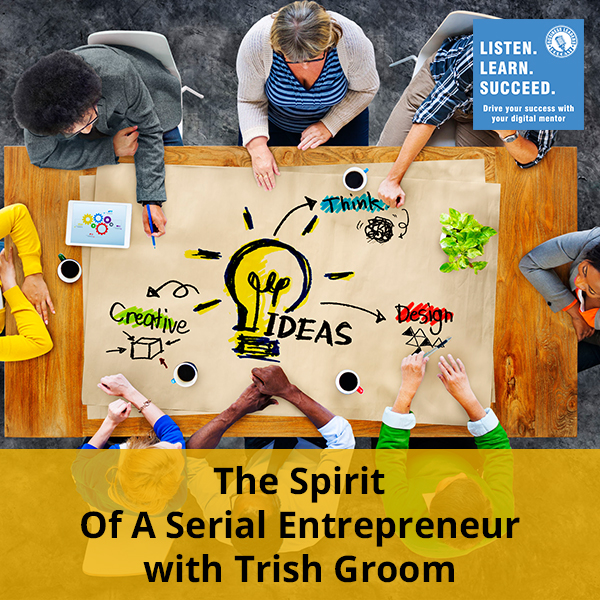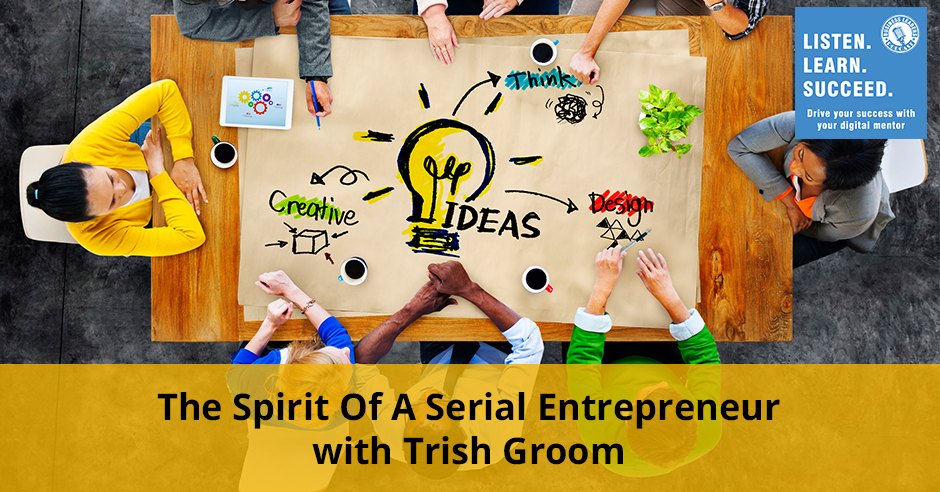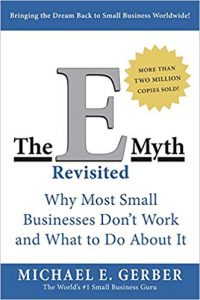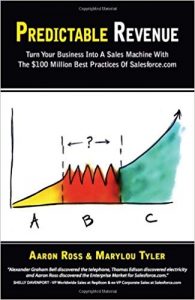The Spirit Of A Serial Entrepreneur with Trish Groom


Trish Groom, business development leader and serial entrepreneur, takes us into her journey towards success as she lays down the attitudes and mindset that got her there. From opening a coffee shop called Sidney’s Café to evolving into other business ventures with Splick-it, Inc, she shows that determination to reach her goals. As a business owner making her own name in the game, she encourages women to become investors as well. She has built this community for women investors to tap into an industry that no one taps them into. Talking more about her businesses, she gives great advice on how to inspire other people to become successful in their areas as well.
—
The Spirit Of A Serial Entrepreneur with Trish Groom
We have Trish Groom on the show. She was the Owner of a coffee shop called Sidney’s here in town. She’s the Cofounder of Splick.it. Trish, thanks so much for taking time out of your day.
Thanks for having me.
Trish is a serial entrepreneur. She’s on more than one business. She’s involved in many different things in the business community. In Splick.it, tell me about your role and who does Splick.it serves?
I was Cofounder and in business development. We built an online pre-order, pre-pay app and web for businesses, for restaurants specifically. We target more franchise companies. The sweet spot for us are franchises that have between 500 and 1,200 locations. We white label for them and provide the service. We manage the backend and the customer experience for them.
I’m not a restaurant person. Let’s say I’m the franchise owner, what improvement or what change should I expect to see by using Splick.it?
A lot of restaurants lose revenue because they lose people at the end of the line. They can’t wait. In the early stages, we were one of the first to come up with this idea where we were taking your pre-order and pre-payment and putting it on an app. That way, you can still as an owner, get that revenue in the door and the customer can still get served quickly like they need to do be.
That’s the sticky factor on the long line. For the app, is it an app that the customer has to have or does an employee come from the restaurant with the app?
We do the marketing. We help the franchise market the app to a customer. They download it and create an account. We have a credit card on file so it’s easy for them to order and pay.
The consumer won’t know that it’s Splick.it because it will be private labeled for the franchises. How long has that company been around?
We started in 2009.
That was an auspicious time.
It was rough, a lot of early-stage friends and family rounds.
 Serial Entrepreneur: If you’re going to run a race, do everything you can to win.
Serial Entrepreneur: If you’re going to run a race, do everything you can to win.
What folks don’t realize is you didn’t come from a business background. Your first foray in Boulder was you bought a coffee shop.
I did buy a coffee shop. What I didn’t realize was that I had never drunk a cup of coffee in my life and I thought that was a good idea. I didn’t realize that was unusual at the time.
Do you drink coffee now?
I do. I learned a lot. I was traveling in South America for a year and had this idea that I wanted to own a coffee shop. Not because I loved coffee, but because I thought that there was some community aspect to it that was intriguing. I came home from South America and I had no money and no business owning a coffee shop. I had no experience whatsoever. I was teaching at the time, but I ended up in Telluride during the summer at the Telluride Bluegrass Festival. My parents probably don’t want to know this part, but I drink a lot of beers and ended up buying a coffee shop from a couple there that I had met and ran into. Two weeks later, the universe conspires sometimes and the next thing I knew, I bought a coffee shop.
When thinking about some of the decisions that business owners make, do you remember the thought process or moment when you decided, “I’m going to do this?” Do you remember what that was like?
Ignorance is bliss. I was willing to bet on myself. I’d always take a chance on me. That was my moment in time. I had no idea how to run any business, but I was like, “I’m going to do it because I believe in me and I will bet on me first.” I take that leap of faith any day. That’s how I went into any business. That was the first moment.
Women can also be investors.
For the parents who are out there saying, “We want to instill that same type of self-confidence,” what do you think your parents contributed toward that? If so, what did they do?
I was super active in sports, so that helped. The self-confidence came from my parents encouraging me to be better than everybody else on the field. Not that I had to be the best shooter because I never was or the best dribbler, but I was the best hustler and they wanted me to be the best hustler. If you’re going to run a race, do everything you can to win to get to the front, be at the front. I was never the best player, but I was encouraged to be captain of the team. Those skills built the confidence of like, “If nobody else is going to do it, I can do it. I’m going to step up and do it because I believe I can do it.” I was supported to believe that.
There are both sides of that leadership gig. When things go well, it’s pretty easy. You have two sisters. Your dad had a particular skill set that he passed onto you guys.
He was a wrestler and he was multiple times the best wrestler in the country. He’s in the National Hall of Fame. He’s won national championships and he had three girls. We got heavily trained.
We were chatting about that a little bit and I said, “Do you still wrestle your sisters?” The answer is, “Yes.”
They don’t want to admit that, but yes.
What’s your favorite hold? What’s your favorite move?
We were trained on the famous Head Chuck. That’s was what he was known for. We know that skill well, single leg, double legs. We were trained that if someone comes up behind us with a gun, what do we do? How do we handle it? It’s helped a lot. In college, I ended up playing rugby and I played rugby for many years. It was a lot of those same skill sets went right in there. Sports have helped me a lot to become a first-generation business entrepreneur. You don’t know what you don’t know in the business world as well.
Tuition is expensive typically in the business world. When you went down to South America and came back, what do you think the chief lessons coming out of that time in South America were?
I traveled with my cousin. Going down to South America as two young women is pretty dangerous. We had to come up with some ways to stay safe. One of them was we shaved our heads the night before we got on a plane to present ourselves as like, “We’re this crazy. You don’t want to mess with us.” That helped but being in those countries for that long, there’s a sense of vulnerability and rawness that you have to be prepared to expose yourself to. Through rawness starts to come to some self-realization and truths that were impeccable for me to go through to achieve some level of success in my life and truths about myself, truths about who I am and where I want to go in life, and what does that look like to me.
It certainly gives you an idea of what less than good looks like. Week one in the coffee shop, thinking back to the thought process and the learning curve, you had some interesting ways of getting tutoring when required. Let’s talk about that a little bit.
I had to get creative quick and being resourceful is something I’m good at. I might have learned that from my dad. We’re not the smartest crew out there, that’s for sure, but we figured out who the smart people are. There are a couple of things that happened in the coffee shop that I didn’t know at the time was going to be super helpful. The first one was that the coffee shop was built on personality. I had asked the original owners to stay on for a year with me because it was built on their personality. I had to get the customers to start trusting me and my personality. There was this transition period that it had taken for me to establish the coffee shop on my own.
We get stimulated by other people’s ideas.
Through that trust, I was able to ask my customers for things that I didn’t know how to do, and I traded coffee for it, and be in that vulnerable state because they’re my customers. They also wanted to help me because we built this relationship. I had no idea how to do accounting. I traded coffee for accounting. I didn’t know how to do marketing, so I traded that. I didn’t know how to do branding, so I traded that. I probably traded more coffee than money that came in. That cost some tuition going in. I also traded coffee for programmers to help me with that first beta on Splick.it, building that first beta, seeing if the idea that I had worked, and solving for my own problem of losing customers at the end of my line.
It’s interesting to address a pain point. You see it in the restaurant business frequently. How do you turn the table? How do you get the customer through? Can you turn the tables enough? It’s the ongoing challenge. Most people look at it then go, “There’s nothing I can do.” The difference for you is you weren’t willing to take, “There’s nothing I can do.”
 The E-Myth Revisited: Why Most Small Businesses Don’t Work and What to Do About It
The E-Myth Revisited: Why Most Small Businesses Don’t Work and What to Do About It
It’s getting resourceful quick and I had amazing customers as well. I had the founder of Celestial Seasonings coming into my coffee shop every day. I had this opportunity to tell me, “What do I need to do?” That’s how I learned about the E-Myth book. I read that and had a complete panic attack.
Did you find that there was resistance for people saying, “Can you help me?” Do you find much resistance with people helping you when you ask?
No, but through sports, I learned the skill of being coachable. That has played out significantly in my life. Coming to the table in a demeanor of, “I’m coachable. I’m willing to listen. I’m willing to learn,” opens the doors quite a bit for me and has carried me far. I didn’t have any resistance there, but I also think there had to be a lot with our relationship.
You think about the best professional athletes, they have a multitude of coaches. You think about the professional golfers, they have a multitude of coaches. You’ll see somebody with talent that’s not coached and you go, “Why aren’t they doing it?” because they clearly have the physical skills. Being able to listen, it’s a lost art. There’s the germination of the idea for Splick.it and your coffee shop. You sold the coffee shop at some point.
I sold it after owning about four years.
For the folks that have a business looking after the sale, what advice or takeaways did you learn post-sale?
I felt like I can fly. I didn’t realize the amount of stress and pressure that I had on myself to succeed. I sold it. I signed all the papers on a Friday at [4:00]. Our coffee shop was luckily closed on the weekends. Monday morning when I got up at [4:30] AM, I felt relief and like, “I don’t have to hold the burden anymore.” That is a beautiful feeling. It’s an addictive feeling, though. You go back into entrepreneurship because you want the thrill of it all. You certainly want the sell too because you want to be relieved.
We talked about how do you exit properly. When you think about the lessons learned on a previous exit, those thoughts, how did that shape your approach to Splick.it after having sold the coffee shop? Did it change how you approached that company?
I can’t say I had the intuition that a lot of those skill sets should transfer because I went from coffee to tech. I didn’t believe that I’ve done this before because it felt different building a tech company. Looking back, almost everything transferred. I didn’t think it at the time.
Women are amazing philanthropists and we have to have that as part of the solution.
Business is business and you hear that a lot. There are a lot of factors in business. You can be selling trucks or you can be doing tech or you can be doing something else. At the end of the day, you have a customer somewhere. You have to take care of the customer, relationships and deliverable of some kind. You’re now in the throes of potentially exiting Splick.it.
That’s the goal, to get acquired there and there’s a lot of activity in this space. We’re going to see something. It’s a matter of when and at a valuation that we love.
It’s an interesting challenge to go through that exit halfway. You’re doing it twice now. You were talking about some of the things that you’re doing in the community and in the community with women about business. Let’s dig into that.
I feel my life is full of a lot of a-ha moments and becoming a woman investor is one of those. I didn’t know as a kid I can be CEO. That conversation never happened. This is also one of those things I learned later in life that women can be investors. When that light switch went on for me, it was game-changing. I was like, “I’ve got to get involved. I’ve got to do this. I have to be part of this solution.” Nobody ever told me before that I can be an investor.
I’m a huge fan of the thought process. When you had that a-ha moment, do you remember what that felt like or what you were thinking at the time?
I remember exactly. It was across the street from here. I was at a luncheon and this woman was raising a fund. I was invited to the luncheon and her speech wasn’t the thing that caught my attention. It was somebody else in the crowd who stood up and said, “I am starting a woman-only fund. Any woman in this crowd could be an investor. I’m going to show you how to do it. You’d be part of my fund and it’s learning by doing. We’re going to go build a fund. We’re going to bring in companies. We’re going to teach you how to be an investor. We can do it.” I was like, “Those words are mind-blowing.” I went to her right after I said, “Count me in, whatever it takes.” Whatever that intuition was, I learned the details later of why it was important to be an investor, that other women step up and be investors.
 Serial Entrepreneur: We’re not here to take over the world. We’re here to bring it back to center and balance.
Serial Entrepreneur: We’re not here to take over the world. We’re here to bring it back to center and balance.
I think about that as like a lightning rod. You were a business owner already. You had sold a business and started another one. You’re at this meeting, telling that you can be an investor. The next thought is as an investor in this group of women, what’s been the follow-on or knock-on effect of you being associated with the women in the investing community?
What I have been exposed to is this network of amazing women. What has been a struggle being a female growing up is not enough role models, especially being an aggressive young girl. I had muscles, but I never saw a girl in a magazine with muscles. I didn’t see a girl in a magazine with muscles until Athletic came out and that store. I felt alone in much of my path and then being exposed to all these women who are everything I’ve wanted to be in life or as an entrepreneur, as a business person, I now have access to. I have an example. I have someone to talk to. I have the ability to get advice from. That has been invaluable for me especially at the stage of where I want to go.
My daughter is out in the space and in the business community and so on. I’ve been a business owner for a long time. When I was growing up, no one in my family had owned a business. You think about that key differential. If you were to start another business after, which I can’t imagine that you’re not, given your experience from these two businesses and the community of women investors, how do you think you would approach the next business differently or would you?
I would because I’ve seen enough pitches now. I know what a good idea is, what a bad idea is or how to even sell an idea. With a lot of the conversations I’ve had with entrepreneurs, I don’t want a list of your exit strategies. Don’t tell me who could potentially buy it. What is it? What’s the plan? Who are you already having conversations with? To start the next businesses, I don’t want to start with just the idea. I also want to start talking to the potential exiters because I want to start that business with what they need in mind. How can I fulfill what their gaps are or their weaknesses are with a business I’m going to build?
If you had your young children, boy and girl, and you were going to take and offer advice to the audience that had young children and they go, “She sounds cool. We want our kids to be like her.” What advice would you offer those folks?
I would love to take my son to Demo Days. There are a lot of accelerators that have Demo Days because it exposes them to people who have ideas. It exposes them to people being brave enough to step in front of a group of people and share their idea. They could be anything. I was exposed to, “You can be a teacher, a lawyer, a doctor.” It’s not until my adult years that I’ve learned of all these possibilities that I would have probably gone after if I knew about them, but I didn’t. I had to take my own path.
You don’t know what you don’t know. Populating the thought process is an interesting thing. My kids are now in the late twenties, early 30s and you look at the mistakes that you get to make that your kids will remind you about later when you thought that you were under foot the whole time. I’ve always advocated for them to do business, but we’ll see how that pans out over the years. We’re shifting gears a little bit. It’s the part of the episode where we talk about things that are influential and so on. What’s a book that’s been influential in your thought process?
 Predictable Revenue: Turn Your Business Into a Sales Machine with the $100 Million Best Practices of Salesforce.com
Predictable Revenue: Turn Your Business Into a Sales Machine with the $100 Million Best Practices of Salesforce.com
I’m reading Predictable Revenue. Being in biz dev, I love the new perspective that they have on lead generation and closing deals. There are a lot of good little nuggets in there.
We get stimulated by the people, cross-pollinate for lack of a better term. You go, “I never thought of it that way.” It’s useful. Looking back over your career to date, maybe a failure or something that was not quite successful that served you further down the road and helped you be successful like you are now.
Failure is a good thing. Investors want you to fail multiple times before they’ll invest in you. It’s not being afraid to fail. The times that I didn’t believe in myself, it wasn’t just a failure. It was a failure to me. That’s where the doubt came in and I let somebody else believe they knew more than me and not in the fact that there are a lot of smarter people and I listened. It was more of that my thoughts and opinions didn’t matter, and I allowed that to happen. Those were the worst of the times. I would look back and be like, “I had the idea the whole time,” but I allowed them to not let me speak up. I didn’t allow them to make me believe that my idea wasn’t good. That’s probably my biggest thing that I had to overcome.
Now, what’s your alternative to allowing that to occur?
I had to identify those types of people. It’s learning who they are and keeping them at long distances. I’m much more intentional of who I bring around and what that circle looks like.
They say you’re the average of the five people you hang out with. I tell folks, “I’m either lowering theirs or they’re raising mine.” Thinking about your message, if you could take an ad out on the front page of the local paper, what would your message be?
The front of mind for me right now is that you can be an investor. I’m speaking to women right now, but you can be an investor. We are trying to figure out ways to make that possible for you.
When you say to be the investor, there’s the comma which means by being an investor, what does that allow you to be or do?
It allows you to be part of the solution. Women are amazing philanthropists. We have to have that as part of the solution. What we don’t have is enough women coming to the table making the decisions of who should be granted a business or not. We see that the entrepreneurs who are getting the money are still the white males. The females aren’t getting recognized with the good ideas and the minorities aren’t getting recognized with the good ideas. Most people want to invest with who they look like. Like attracts like. Without bringing in the investments, we aren’t going to see the women we need to see in the business world or the minorities we need to see solving major world problems.
We need to see solving major world problems as a matter of perspective.
It’s a matter of perspective. I see things the way I see it based on my accumulative experience. You see things the way you see things based on your accumulative experience. It’s not that one’s better than the other. They’re different and they have value in that you go, “I’ve seen that movie before.” You go, “I haven’t seen that movie before.” You think about being in South America and how that changes how you think even now. It’s not a small thing to go down with two women and bounce around South America for a year. The good news is you’re back. Looking at allocation of resources, what’s the best allocation of either time or initiative that has helped you the most? Business or personal, either way.
I have been doing a lot of mentor and advisory roles. What is important is that as busy as we are in our lives, it’s still as important to show up for younger generations especially women. They need those role models but also, I’m mentoring young men. It’s important that they see women know a lot about this world. Since we are half of the population, it’s important that they understand our perspective, our roles and what we can bring to the table.
I oftentimes think about the discourse between what women think and what men think. Sometimes there’s an extraordinary difference, but we all want the best that we can for our families. We all want to live a life of significance. You think about that and you go, “Guys aren’t that communicative. It’s important for both the boys and girls to hear that message. Maybe it resonates better at certain ages from one gender versus the other.” Over the past few years, what belief or protocol have you put in place that’s helped you and your business efforts the most?
What I found to be successful is the king or queen of the room is not the CEO, it’s the idea. Everyone serves the idea. Each one has a different role in how we serve the idea, but the execution has to be like, “This is the idea and it’s not the person that we’re serving.” That sets the tone of the objectives of that company or that phase of the company. Objectives are not about a team or a person, it’s the execution of that idea. Those objectives change. Defining as the CEO, what are those objectives? How do we align structure and finances, information and meetings around those objectives that serve the idea?
You’re connecting everybody on the team do the idea. It’s not a simple thing. If you were going to offer advice to a new business owner or CEO that was taking that role for the first time, what advice might you offer?
This is cultural that the CEO is supposed to have all the answers. They’re supposed to be the smartest person in the room. They’re supposed to lead this team naturally and seamlessly. As we know, it doesn’t work out that way, but it’s also coming into the role of being okay with that and setting yourself up to where the reason why you have a team is to find the smartest people and then enable them to solve those problems, not feeling like you have to do it. I’ve seen so many times where someone’s hired an expert but never allow them to execute on their knowledge. That’s an ego thing, in my opinion.
You find much resistance with people helping when you ask.
In the day-to-day operations when you’re in a company, there may be a habit that you have that helps move the company forward. What would be that habit, belief or self-talk that keeps you going and keeps the company pointed in the right direction?
I’m a competitive spirit and that has served me well in the business world, but not so well in my marriage. I’ve had to learn to turn that competitive spirit on and off or dial it in and out. Being that team player, I want to win. I want my team to win. If I know there’s a win, whatever that goal is or multiple goals, that’s what I do. I motivate the team to win the game. That in itself energizes me and that’s a self-talk.
You’re a very strong personality. You’re accomplished and you’re female. Not that atypical nowadays, but you look at the generation of men that didn’t grow up around that. What advice would you offer to a male counterpart when they’re working with a strong female lead or personality?
I like to say it shouldn’t be any different than a male but what I have found is there is some insecurity that comes with that. Women who are on this forefront of elevating all women are not trying to swing the pendulum from this patriarchal world all the way to the other side. We are trying to get the pendulum back to the mill. That’s the fear factor that men come often with that insecurity of like, “Remember us when you’re up top,” and we laugh at that because we’re like, “We’re not here to take over the world. We’re here to bring it back to center and balance.” The strong women who are those champions or who are working on it are not being aggressive to be aggressive. We’re trying to sit in our power and be comfortable with that power. We’re also learning how to be comfortable with that power so work with us.
How do folks reach out to you in social media? How do they find you?
I’m on Twitter @TrishGroom and Instagram. I use Twitter probably more of the business-facing. Instagram is more my family realm.
We can find you on LinkedIn too. This is the last quiz for you. If I was to talk to your colleagues and say, “What are you best at? Or what’s your superpower?” What would they say? How do you use that?
What I am good at is reading people. I can get detailed on people, meaning their demeanor, their body language, the fluctuation of their voice, the way they shift, where they pay attention to. I’m taking in all the information and then quickly adjusting how I approach them. It can be from word to word, conversation to conversation. I’m capable of doing that so I’m able to build relationships quickly and build a lot of trusts because I can read people super-fast. That helps in business development in that space, but whether they know it or not, I’m doing it to them too.
What I’m thinking about as you as a young girl with your sister. Your dad’s teaching you wrestling and you’re watching them.
You do get to vanish. Know what they know and don’t know quickly.
Trish, I can’t tell you how much I appreciate you taking the time.
Thanks for having me and thanks for doing this.
This has been a lot of fun.
Thanks.
Links Mentioned:
- Splick.it
- E-Myth
- Predictable Revenue
- @TrishGroom– Twitter handle
- Trish Groom on Instagram
- Trish Groom on LinkedIn
- https://www.SplickIt.com/
About Trish Groom
 I am an accomplished, resourceful, and passionate business development leader and entrepreneur with 13+ years of diverse experience in emerging and mid-size environments. I have a proven track record of launching companies, leading them through rapid growth, driving business development, and building dynamic teams to sustain growth. I am seasoned in cultivating and growing strong business and client relationships. I am a hands-on team leader and innovator with excellent communication, client relations, problem solving, and negotiation skills.
I am an accomplished, resourceful, and passionate business development leader and entrepreneur with 13+ years of diverse experience in emerging and mid-size environments. I have a proven track record of launching companies, leading them through rapid growth, driving business development, and building dynamic teams to sustain growth. I am seasoned in cultivating and growing strong business and client relationships. I am a hands-on team leader and innovator with excellent communication, client relations, problem solving, and negotiation skills.
Supervisors and coworkers tell me I am both a connector and executor. I thrive in creating and implementing business development strategy. I am known to think outside the box bringing the right resources and people together to transform an idea into action.
Some of my areas of expertise include:
Sales Management – Team Leadership, Mentorship – Market Development
Strategic Development – Client Relations – Accelerator Implementation
Process Creation – Change Management – Employee Engagement
Client-Facing Project Management – Business Growth Development – Corporate Strategy
I am looking for my next opportunity to bring my natural skill set and background together, let’s connect to start a conversation on how I can assist you and your team: trishgroom3@gmail.com
Love the show? Subscribe, rate, review, and share!
Join the Business Leaders Podcast Community today:
- businessleaderspodcast.com
- Business Leaders Facebook
- Business Leaders Twitter
- Business Leader LinkedIn
- Business Leaders YouTube
The post The Spirit Of A Serial Entrepreneur with Trish Groom appeared first on My podcast website.